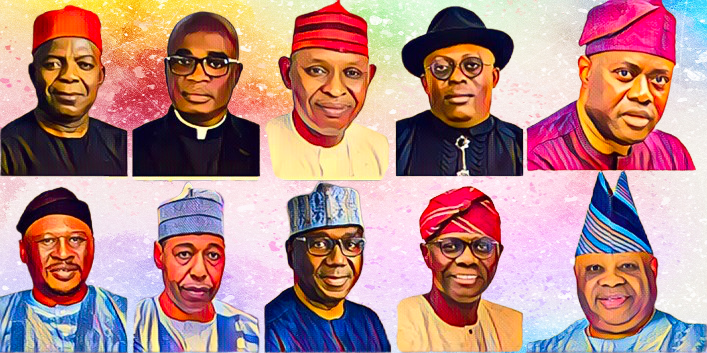Key Points
- Governors bridge state governance with federal policy in Nigeria.
- Economic management and security highlight governors’ critical responsibilities.
- Governors’ national influence shapes Nigeria’s political and policy direction.
Nigeria’s federal system of governance is a fascinating interplay between the central government and 36 states, each governed by an elected leader known as the governor.
These governors are not just administrators but political heavyweights whose actions ripple across the nation. In understanding Nigeria’s federal structure, the role of governors becomes crucial—they are the glue binding state governance with federal policies. But what exactly does a governor do, and why are they so powerful in Nigeria’s political setup?
A journey through history: How governors became what they are today
The role of governors in Nigeria didn’t start with democracy. Even before independence, the colonial administration used regional leadership to maintain order. This evolved over time, especially during military regimes, when governors were essentially appointees of the federal military government.
Fast forward to 1999, when Nigeria transitioned to democracy, the governorship role became constitutionally rooted. The 1999 Constitution gave governors significant powers, defining them as the highest-ranking executives within their states.
This historical backdrop explains why the office of the governor is often seen as a stepping stone to higher political ambitions. Many former governors have gone on to become senators, ministers, and even presidents.
What the constitution says about governors
Under Nigeria’s Constitution, governors hold immense powers. They are the chief executives of their states, controlling budgets, directing policy, and managing resources. Beyond this, they also play a federal role, sitting on national bodies like the National Economic Council, where state and federal interests intersect.
Governors also have emergency powers, allowing them to act decisively during crises such as natural disasters or security breaches.
The dual responsibility to their state and the federation makes governors unique. They are not just state leaders but also critical players in shaping national policies. This duality can be both a blessing and a burden, especially when federal and state interests clash.
Economic drivers and policy architects
Governors are economic powerhouses for their states. They oversee infrastructure projects, healthcare, education, and other public services. Their policies can attract—or repel—investments. For instance, states like Lagos and Kaduna have become economic hubs thanks to progressive governance, while others struggle due to poor management.
However, revenue generation remains a thorny issue. Most states rely heavily on federal allocations, which makes discussions around fiscal autonomy and resource control highly contentious. The governors’ push for state-level control of resources like oil and minerals highlights their critical role in economic debates.
The security question: Governors as Chief Security Officers
In theory, governors are the chief security officers of their states. However, in practice, their powers are limited because security agencies like the police are federally controlled. This has led to a growing call for state policing—a proposal that divides opinion.
With rising insecurity across the country, from banditry in the northwest to secessionist movements in the southeast, governors often find themselves at the frontline of public safety challenges.
Some governors have risen to the occasion, working closely with federal agencies to combat threats. Others have struggled, highlighting the complexities of security in a federal system.
Power players in national politics
Governors are not just local leaders; they wield significant influence on the national stage. Through the Nigerian Governors’ Forum, they collectively shape policies, lobby for state interests, and sometimes challenge federal decisions.
Their role in presidential elections is particularly noteworthy, as they control vast political machinery within their states. A governor’s endorsement—or opposition—can make or break a candidate’s chances.
However, this influence is a double-edged sword. Critics argue that some governors prioritize personal political ambitions over state governance, leading to allegations of corruption and neglect.
Challenges and controversies
No discussion about governors in Nigeria would be complete without addressing the controversies. From accusations of mismanaging state funds to undermining local government autonomy, governors have faced their fair share of criticism. The lack of accountability in some states fuels public frustration, especially when infrastructure projects stall or salaries go unpaid.
Yet, despite these challenges, governors remain central to Nigeria’s democratic journey. Their ability to mobilize grassroots support and implement policies gives them a unique position to strengthen governance at all levels.
The road ahead: Governors and Nigeria’s future
As Nigeria looks to the future, the role of governors will only become more significant. The push for constitutional reforms to redefine their powers, the increasing use of technology in governance, and the need for youth inclusion are shaping the narrative around state leadership. Governors have the potential to drive these changes, serving as agents of progress in Nigeria’s federal structure.
But with great power comes great responsibility. To truly impact Nigeria’s development, governors must prioritize transparency, accountability, and collaboration—both with the federal government and their constituents.
Conclusion: Beyond titles and powers
Governors in Nigeria are more than just administrators; they are the heartbeat of state-level governance and influential players in national politics. Their actions—or inactions—have far-reaching implications, from economic growth to security and beyond. As Nigeria navigates its complex federal system, the governors’ role will remain pivotal in shaping the nation’s destiny.


